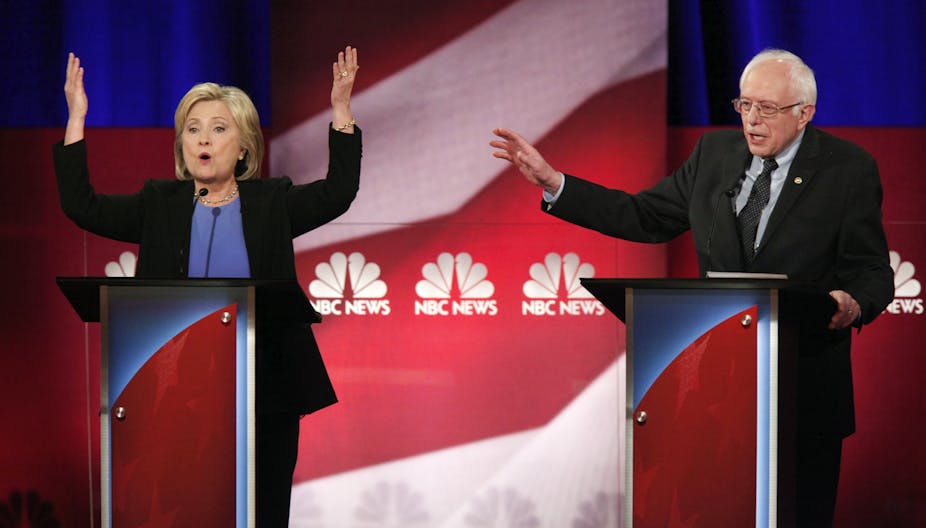The gloves are off in the Democratic race, and it’s now abundantly clear that Bernie Sanders can throw a punch.
On Sunday night the Democratic presidential candidates met for their final debate before the Iowa caucuses. Hillary Clinton entered the debate with a 25-point lead in the national polls, a big fundraising advantage and a virtual monopoly on major endorsements.
But Clinton knows from personal experience that no lead is safe until the voting starts. In the 2008 presidential race she squandered an even bigger lead over Barack Obama.
Could history repeat itself in 2016? That question haunts the Clinton campaign team, particularly now that Sanders leads Clinton in New Hampshire and trails her by just two points in the latest Iowa poll.
Sunday night’s debate will only add to Clinton’s worries. Sanders skillfully fended off Clinton’s attacks and emerged from the debate stronger than ever.
Clinton attacks backfired
There was no mystery what Clinton’s debate strategy would be. With Sanders moving up in Iowa and New Hampshire, the central focus of the Clinton campaign is attacking the Vermont senator.
Last week Chelsea Clinton launched a deeply disingenuous attack on Sanders, claiming that he wanted to eliminate Medicare. In fact, Sanders wants to extend Medicare to the entire population via a single-payer healthcare plan like the Canadian system. One day after the phony Medicare dust-up, Clinton surrogates demanded that the 74-year-old Vermont senator release his medical records to prove his good health.
Hillary Clinton continued the attack on Sunday night. From the debate’s opening minutes, she came out swinging, attacking Sanders for his uneven voting record on gun control and his ambitious heath care proposals.
But none of Clinton’s attacks did serious damage to Sanders, and he was strikingly effective with counterattacks of his own.
Sanders drew blood when he repeatedly criticized Clinton for her close ties to Wall Street. He reminded viewers that Clinton received US$600,000 in speaking fees from Goldman Sachs, a New York investment bank that many Democratic voters see as the preeminent symbol of economic inequality in America.
Sanders also scored points with his sustained criticism of Super PACs and the corrupting influence of large campaign contributions. No Super PACs support Sanders, and the senator has proudly based his campaign on an enormous number of small donors. Sanders’ rejection of big money politics resonates with rank-and-file Democratic voters, who overwhelmingly favor campaign finance reform.
In short, Sanders used the debate effectively to position himself as a strong, authentic and defiant liberal candidate for president.
Low-profile debates
The best news for Clinton is that the debate flew under the national radar screen.
That’s not by accident. The Clinton campaign used its influence within the Democratic National Committee to reduce drastically the number of debates and to schedule them on weekends when viewership would be light.
The campaign’s logic was that Clinton had nothing to gain and everything to lose from the debates. Once again, memories of 2008 shaped the Clinton team’s 2016 strategy. In 2008 Clinton debated Barack Obama 25 times, an all-time record. Those 2008 debates helped Obama erase Clinton’s huge polling lead and ultimately propelled him to the Democratic nomination.
But the fact that the Democratic front-runner is leery of debates should trouble the party’s rank and file. Instead of strengthening her position in the race, Clinton’s aversion to debates only serves to reinforce her image as aloof and out-of-touch with the party’s liberal base.
Is Sanders electable?
Vice President Biden didn’t do Clinton any favors last week when he praised Sanders for having unique credibility on the issue of income inequality. In a harsh rebuke of Clinton, Biden noted that “It’s relatively new for Hillary to talk about” the issue.
Clinton should take Biden’s criticism to heart. She is never going to be able to get to Sanders’ left on issues like income inequality. Instead, Clinton’s best argument is that she is ultimately more electable than Sanders.
U.S. political history has repeatedly demonstrated that Americans have a strong tendency to prefer the more moderate candidate in presidential elections.
Therefore, to prevail in the Democratic primary race, Clinton must define the 2016 election as a battle between the Democratic heart and the Democratic head.
Clinton’s argument to liberal voters boils down to this: you might love Sanders, but if you want to beat the Republicans in the fall, the safe bet is to nominate me.
South Carolina is key
Although Iowa and New Hampshire will dominate news coverage for the next three weeks, the most important early primary is South Carolina on February 27.
South Carolina is Clinton’s firewall. The South Carolina Democratic Party is predominantly composed of African Americans, the backbone of the Democratic Party and a key Clinton constituency.
The Palmetto State is a must-win for Clinton. She can withstand early losses in Iowa and New Hampshire as long as she rebounds in South Carolina. As of now, Clinton holds about a 40-point lead in South Carolina polls.
But even if Clinton wins South Carolina decisively, the race will be far from over. The rising strength of the Sanders campaign reflects the fact that a battle for the soul of the Democratic Party is now under way.
Although Clinton’s institutional strength gives her a clear edge in that battle, it’s no longer a certainty that she will win the nomination. Sanders is mounting a far more serious challenge than anyone expected.

